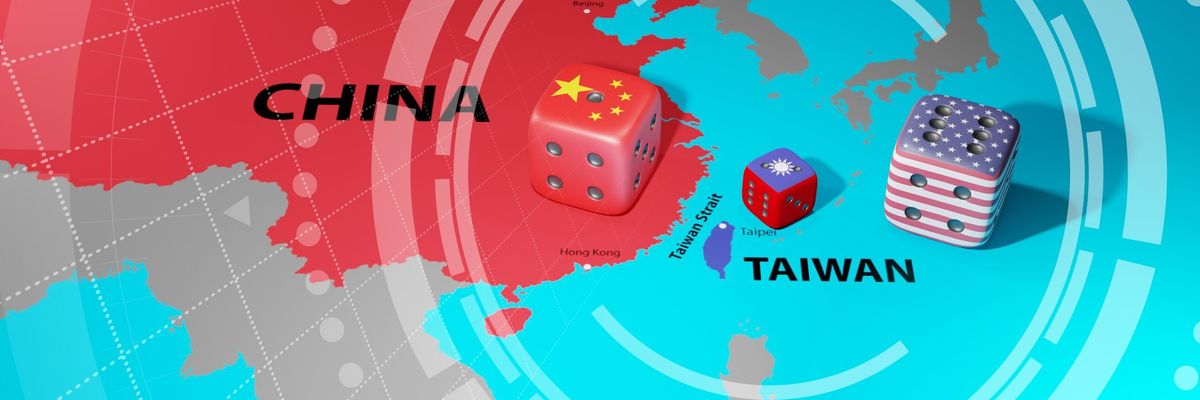In the frenzied rush towards ever greater levels of "intense competition" between Beijing and Washington, one issue that could generate actual conflict between the two powers has been receiving particularly close attention: Taiwan. In recent months, and despite the virtual summit between Joe Biden and Xi Jinping last month, Sino-U.S. tensions over the island have increased significantly, largely due to unprecedented levels of Chinese sabre rattling and U.S. and Taiwanese efforts to draw closer together both politically and militarily in response to such provocations.
This constitutes an escalating, deterrence-centered dynamic of action and reaction in which each side seeks primarily to convey its resolve to the other, without offering much in the way of credible reassurances. While seen by each capitol as necessary to maintain stability across the Taiwan Strait, this dynamic is in fact destroying the basis for peace between China and the United States established at the time of Sino-U.S. normalization, when Washington acknowledged the Chinese notion that Taiwan is a part of China and Beijing committed to pursue peaceful reunification as a top priority.
For China, the threat to this essential understanding derives from the fear that — through its deepening and expanding support for Taiwan — the United States is steadily encouraging, and will eventually endorse, a clear One China, One Taiwan situation that would end its One China policy. For Washington, the threat derives from the fear that an ever stronger and more assertive Beijing will soon discard its peaceful unification policy in favor of a policy of seizing Taiwan by force, or in fact has already done so, in response to domestic nationalist pressures and Xi Jinping’s supposed commitment to resolving the Taiwan issue during his term in office.
Little solid evidence exists to confirm either of these fears, but in the deeply suspicious atmosphere that now dominates in both capitals, evidence takes a back seat to worst-case, emotionally and ideologically charged speculation. Rather than seeking a way to inject new credibility into the original Sino-U.S. understanding reached regarding Taiwan through stabilizing confidence building measures, both capitals instead merely repeat what has become reflexive mantras in support of One China (for the United States) and peaceful reunification (for China), while continuing to take actions that belie such assurances.
This hypocrisy can only continue for so long before one side loses patience with the escalating tit-for-tat dynamic and decides to convey what is intended as a mind-clarifying signal of resolve to the other, thus triggering a crisis that no one desires but both sides might then seek to resolve in their favor by forcing the other to end its threatening behavior.
On the U.S. side, the trigger for such a crisis could come from what Beijing regards as unambiguous future American actions to confirm Taiwan as a critical strategic asset for Washington, to be kept from Beijing in its struggle against China. This reckless viewpoint — which runs directly counter to the U.S. One China policy and thus basically goads Beijing into responding with unprecedented resolve — is gaining steady ground among many U.S. defense analysts and politicians. For example, support for this idea in Congress is seen in the so-called “findings” of the U.S. Innovation and Competition Act now making its way through the legislature. They clearly, and erroneously, describe the value of Taiwan to the United States in strategic terms.
A major crisis with Beijing would almost inevitably ensue if a U.S. administration were to attempt to breathe life into this notion by radically improving its military relations with Taiwan in response to real or imagined Chinese provocations such as undertaking joint military exercises and/or permitting repeated visits to Taiwan by U.S. warships and senior U.S. military officers or civilian defense officials. No one should doubt the level of alarm such radical challenges to the Chinese nationalist mission of reuniting Taiwan with the mainland would pose for Beijing.
In the case of China, the trigger of a crisis could be an unprecedented action designed to convey Beijing’s willingness and ability to employ force against Taiwan. This could take the form of an armed seizure of an outlying island under Taipei’s rule, the flying of fighter or surveillance aircraft over the island, or some other type of coercive pressure coupled with a demand for Taipei to come to the negotiating table. Any such action would almost certainly provoke the United States to greatly strengthen its military and political ties with Taiwan, which would in turn provoke an equally (or even greater) escalatory response from Beijing.
Some might argue that neither of the above actions is likely, given the high risks and costs involved, and the possible Chinese belief that time remains on Beijing’s side (reflected in Xi Jinping’s recent statement during his summit with Biden expressing patience toward the Taiwan issue).
A Sino-U.S. crisis and possible conflict over Taiwan is not imminent. But in the absence of sustained bilateral discussions and credible, verifiable actions designed to reduce the high level of overall suspicion each side holds about the ultimate motives and intentions of the other, the above dangerous dynamic will remain dominant and indeed likely worsen, given the overall dismal state of Sino-U.S. relations. And if it does, the Taiwan issue could ultimately serve as another example of what history has often shown to be the case: that actions originally intended primarily to deter perceived threats and miscalculations actually end in provoking conflict, by failing to include credible assurances and explicit understandings designed to eliminate worst-case fears.
















